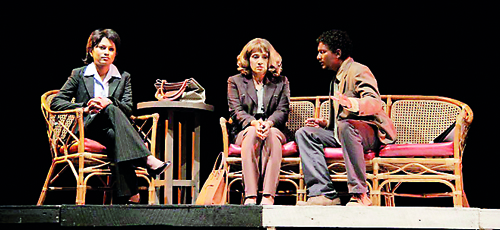A play that generates complex and deep entertainment
“Hetak Näti Ratak” (A Country without a Future) directed by Buddhika Damayantha disseminates a rare experience to the Sri Lankan audience. It is a translation of “Green Man Flashing” by the famous South African playwright Mike van Graan based on the socio-political realities of post-apartheid South Africa. Critics at home and in the West have categorized it as a “Political Thriller,” considering its ability to arouse such emotions as anger, fear and to a certain extent disgust in the minds of the audience. It depicts the contradictions and dilemmas faced by the newly liberated South Africa around a series of incidents that took place on the eve of the second presidential election in 1999.
A reviewer who wrote in August 2012 on a Cape Town production of the play had the following to say:

From the outside, looking in: A scene from the play
Corruption, a spin-doctor, a court case, sexual violence and a murder. Another day, another front page? In this case, they are some of the ingredients of Mike van Graan’s play Green Man Flashing, which is one of the Artscape Arena in Cape Town. The play was written in 2003, which makes you realise how little things have changed in nine years and/or how regularly news themes are repeated.
Interesting, and to the credit of the translator (Prageeth Aluthwattage) and director Buddhika Damayantha of the Sinhala play, is the fact that the South African political thriller has been converted into a socio-political epic play (in Brechtian sense) on the Sri Lankan stage.
Two main factors have contributed to this change and made the play even more meaningful and entertaining to the Sri Lankan audience. First the South African situation depicted in the original play, which according to the reviewer still prevails, is also the reality faced by citizens of Sri Lanka. Second there is one decisively important difference between the original and the Sinhala translation: the Sri Lankan audience can observe their own reality set against post-apartheid South Africa. This enables the Sri Lankan audience to see the socio-political situation in this country from an outside perspective. Hence it gives the Sri Lankan spectator the ability to take a critical stance with regard to his own environment without identifying with the characters of the play. This is in contrast to South African counterparts who can get closely involved with the situation depicted in the play.
Gabby Anderson is the white private secretary of a black government minister who is expected to be the country’s next president. According to Gabby one night he raped her. Gabby’s ex-husband Aron Mathosa is an important official of the governing party and he tries to persuade her not to take the rapist to court. He acts on the advice of the party leadership; a court case against the politician would instigate a massive scandal that would endanger the peace of the country and also the life of Gabby. At the same time the governing party sends an underworld thug, Luthando Nyaka, to threaten Gabby but she shoots him. However, Luthando, who was only wounded, is then killed by her ex-husband, who takes every precaution to hide his involvement in the killing. Gabby becomes the suspected killer.
Another important character is Gabby’s white friend Anna Richards who is a lawyer working for women’s rights. She tries to convince Gabby to go to court. Her argument is that remaining silent would condone the rape. In his conversation with his ex-wife, Aron Mathosha makes an offer to her on behalf of the party: if she does not go to court she will get a post in a South African embassy anywhere in the world. Theo Adam, who had been a police officer of the white government, became a police officer under the new regime after facing the famous Truth Commission and obtaining amnesty. This very sensible police officer managed to record the whole episode but keeps it to himself without telling anyone.
Gabby, who still has a sentimental attachment to her ex-husband and dead child’s father, faces a very complex situation. She seems to be aware of the danger she faces if she goes to court. The last scene of the play is the court scene regarding Luthando’s murder, with Gabby giving evidence via teleconferencing from Australia.
Her last words to the audience, which are communicated visually using digital technology on a screen, in the Sinhala play are (in English) “Where shall I start?”
Gabby’s ex-husband’s mission for the party has been accomplished. The peace of post-apartheid South Africa has been secured. However, the rights of the woman have not only not been secured but have also been betrayed.
The spectator who leaves the theatre does not approve of all that has happened on stage. He/she is not convinced that what is happening around him/her is the ideal, and is forced to think of a better alternative.
This play by Mike van Graan discusses the socio-political contradictions and dilemmas faced by many of our societies. The strength of its Sinhala production lies in the complex and serious entertainment it provides to the spectator. Corrupt and opportunistic politicians and their henchmen, and also those who fight for social justice and human rights, will be able to enjoy this play, since it enables them to look at themselves and their activities from different perspectives.
It is also noteworthy that the techniques used by the author of the original play, such as the two court scenes and a character such as Theo Adam, have been profitably and more meaningfully utilized by the director of the Sinhala production to present characters and situations in a way that helps the audience to look at them from the outside or, in other words, enables them to take positions without involvement with them.
( The writer is former head, Dept. of Fine Arts, University of Peradeniya)


